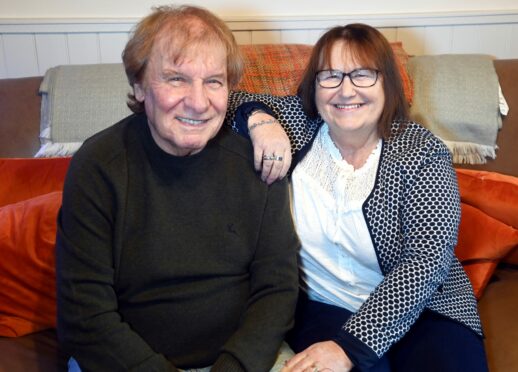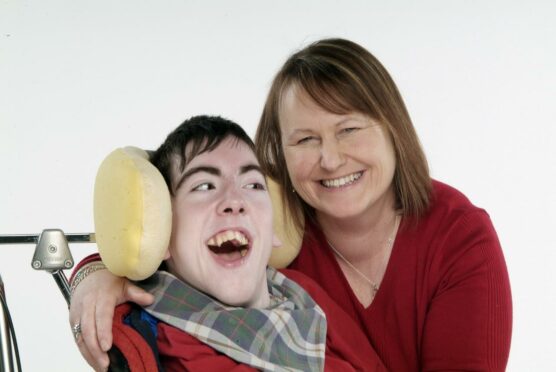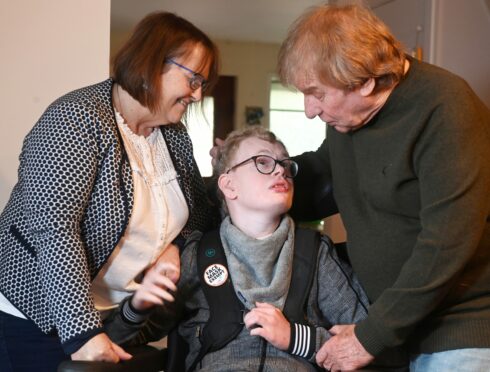With three boys of their own, Jenny and David Whinnett’s family was complete by anyone’s standards.
But the north-east couple had other ideas – and a near-40-year fostering career followed.
And now, as they retire, the St Cyrus husband-and-wife team have been sharing their advice to anyone considering following their lead.
The Whinnetts began looking after youngsters in the mid-1980s.
The pair have three sons of their own and eventually fostered a disabled three-year-old boy called Craig, who they later adopted.
Craig had multiple learning disabilities and died at the age of 21 – after medics said he might only live until he was 10.
Jenny and David talk about their experiences and give some hints and tips in this video.
Inspiration to begin fostering
Jenny and David hail from Liverpool and after being involved with a number of different groups and they are closing the curtain on a 17-year stint with Barnardo’s.
They have looked after Will, who is now 21, since he was 10 and are also part of the Aberdeenshire Shared Lives scheme which means they also care for 25-year-old Liam, who is disabled.
Barnardo’s regularly appeals for foster carers to come forward across the north and north-east as it looks for more help for youngsters.
Throughout Scotland in 2019, there were 5,252 children being cared for on a temporary basis in around 4,000 homes.
Speaking about what inspired them to start fostering, Jenny said she had experience with charity in England.
She said: “In my teens, I had done voluntary work with Mencap down in England. I had a friend who had a son with learning disabilities.
“We always thought that when our own children were at a certain age we’d foster.
“We saw an advert on television for Barnardos and we thought that was ideal so we approached that project.
“The process to become a foster parent is quite intense because it means you have to reflect on your own life and think about looking after other people’s children.
“We went with Barnardos and then had a six-month break because we had adopted our son Craig so we moved onto Tayside fostering and adoption.
“We approached the fostering service with Barnardo’s so we could work with children with disabilities.”
Fostering led to adoption
After fostering Craig, David and Jenny decided to adopt him.
He had multiple learning disabilities and at the age of four doctors said he would live until he was 10. He was 21 when died.
The family regularly visited Iona and this is where they buried Craig’s ashes when he died in 2008.
David, 76, said it soon become apparent that his disabilities were greater than they first realised.
He said he asked a doctor how long he would live when Craig was around five.
David said: “Once we had him for a number of years, we found his condition was more profound than what we’d thought.
“I asked his paediatrician and he said if he lives until 10 he has done well. That is what he said to me.
“He must’ve been about four or five then but got him until he was 21. There was a lot of hard graft and tears.
“By that time we used to go to Iona every year because we became associate members of the community. We always took Craig with us.
“When he passed away that is where we laid him to rest.”
Advice for anyone considering fostering
The St Cyrus fostering couple have also been giving their tips for anyone looking to go down the same road as them.
Jenny, 68, said that while fostering is “rewarding” it is also a “challenge”. She feels gaining some experience first is vital
She said: “First of all, they’re not your children. One of the things that can cause difficulties for people when they start off is that they come with a history
“So some of the things they will experience with the children are from their history and separate yourself from that.
“Yes, you want to support and help them all you can but if you get the attitude ‘I must have done something wrong for them to behave like this’ you are going to find it very hard.
“You have to gain a very warped sense of humour so you can laugh things off.
“Take all the training you are offered so you have an armoury of information behind you.
“Really look at supporting your own children well so that they also have lots of support with having this stranger coming into their home.
“Maybe don’t jump right in with a long term or emergency placement or maybe do what we did at first with respite.
“Take your time getting that experience and the needs of different children. If they have all that they will take to the challenge and find it very rewarding.”
More from the Schools and Family team
Aberdeen school to close boarding due to pandemic impact
Going wild in the classroom: Mum’s lockdown brainwave inspires new wildlife resource


